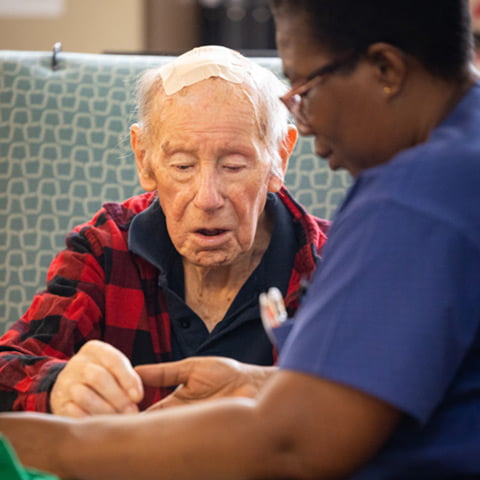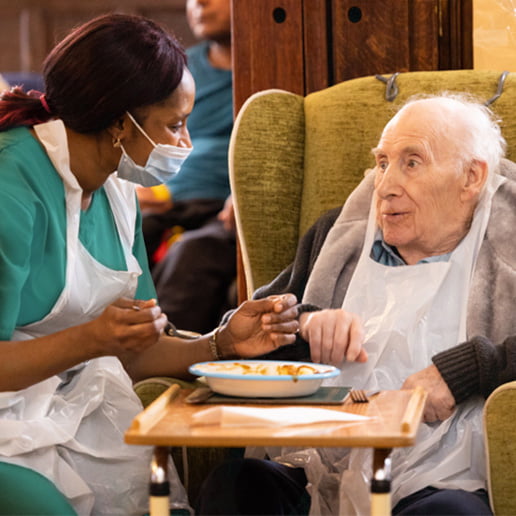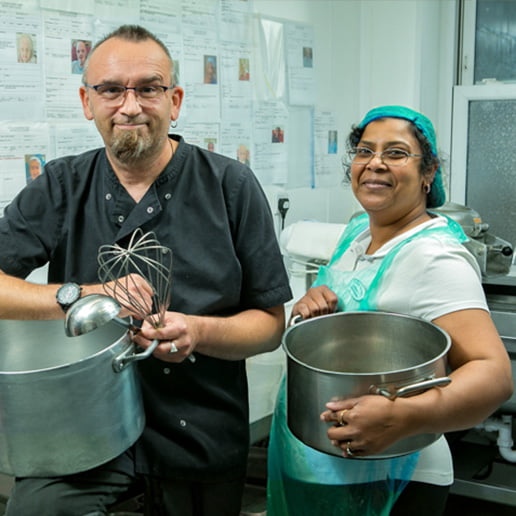At Prime Care Group, we aim to provide a secure, relaxed and homely environment where care, well-being and comfort is of prime importance.
Each of our two care homes offer specialist care for residents with dementia.
What is dementia?
Dementia is a term used to describe a wide range of symptoms. There are many different types of dementia, but the most commonly recognised types include Alzheimer’s disease, fronto-temporal dementia, vascular dementia and dementia with Lewy bodies.
Typical symptoms associated with dementia include memory loss, difficulty with thinking, problem-solving and communicating.
Dementia is caused by the brain cells gradually dying, which results in cognitive impairment. Although there are drugs and other medical interventions which can slow down the progression of dementia or lessen the symptoms, there is no cure for the condition.
The specific symptoms that someone with dementia experiences will depend on the parts of the brain that are damaged and as everyone is unique, so will be the experience of living with dementia.

The National Dementia Strategy
In 2009, the Government published the National Dementia Strategy, which sets out standards for dementia care.
The purpose of this strategy was to provide better care and support for people suffering with dementia as well as support for their families.
It has resulted in a marked increase of diagnoses made each year, which means that appropriate care and support can be provided when it is needed.
Our Dementia friendly care homes
Each of our homes are suitable for people living with dementia with dementia qualified and experienced staff who are on duty 24 hours a day.
We understand that moving to a care home can be particularly challenging for people with dementia, who may find changes to familiar routines, surroundings or routines confusing and frustrating.
Our extensive experience in supporting people with dementia enables us to make the transition process as stress-free and reassuring as possible.
Wherever possible, we involve our dementia residents in drawing up their own personal care plan and we also consult with family members so that the care we provide is completely tailored to each individual’s needs.

Providing safe environments
We recognise the importance of supporting residents with dementia by providing safe, accessible, friendly, familiar environments.
This means not only protecting them physically, but also protecting them mentally by creating a comforting place to live.
We place the emphasis on friendly, warm and person-centred care, delivered by trained, supportive staff who understand dementia.
Here are just a few examples of how we achieve a dementia friendly environment in our homes:
As the name suggests, wayfinding helps our residents find their way. It allows them to retain a level of independence and includes:
- Memorabilia in memory boxes next to each resident’s bedroom door, containing items of interest or importance to the individual
- Windows along paths and corridors
- Stimulating views help ensure the wellbeing of residents
Hallways and corridors can be confusing to somebody with dementia. Imagine finding yourself in a maze with countless paths and unfamiliar twists and turns – you would appreciate a few clues to help you find your way.
It is the same for our residents. That’s why we have tried to make our hallways and corridors as clear and unwinding as possible. We try to avoid dead ends and if a corridor is long, we provide areas of interest along the way to act as familiar markers, which act as wayfinding, so it is clear where the dining room or toilet is situated.
We also use contrasting handrails to create bold relief as well as practical support.
Painted staff doors blend into the walls wherever possible so that only doors that need to be used by the residents are clearly visible.
Personal living spaces are important to everybody because they represent the opportunity to personalise a space you can call your own.
We encourage our residents to add personal touches to help prompt memories, whether through objects, photographs or personal furniture.
Bedrooms are warm and welcoming and we actively encourage our residents to bring in anything which helps them feel at home.
We all need time alone, and so do our residents. That’s why we have created rooms where residents and their families can have some private time together. Without a chance for a little solitude, residents can sometimes become anxious and our trained staff recognise this although we are of course always mindful of the need to ensure our residents remain safe.
Each individual’s environment is arranged and adapted to encourage freedom and safety, while minimising situations that could cause distress.
Community space is important because it provides an opportunity for social interaction, mental stimulation and familiarity. It helps our residents continue to live life to the full, in a safe setting. We also try to make our environments welcoming and stimulating.
Our community spaces are clearly identified with distinct signage and with safety in mind. We also understand that there is a fine balance in ensuring that community spaces do not feel crowded, as this can sometimes be a cause of distress for residents with dementia.
Access to the outdoors is a fantastic way for residents to enjoy the fresh air. The familiarity of a garden or a chance to listen to the sound of bird song or enjoy sensory plants and flowers, stimulates memories and provides a great deal of pleasure.
With safety as a top priority, our secure outdoor areas are created with clear pathways, creating a feeling of freedom for our residents, whilst remaining sensitive to their practical needs.
Personalised care plans
Delivering personalised care, tailored to each resident’s individual needs, wishes and preferences, is at the heart of everything we do so a key priority is getting to know each resident.
It is very important that we gain as much life history about each person we care for as possible. We take time to understand what makes each individual tick and what is important to them. This is an invaluable way of ensuring that our staff really get to know and understand each person.
We want our residents to be able to spend time doing things that they enjoy, which is why we will always have available a wide range of interesting and stimulating activities which are particularly suited to residents with dementia.


Health care
All of our residents are able to continue to see their own GP where practical. We can also arrange visits to see other health professionals as and when required, such as an optician, dentist, chiropodist or physiotherapist.
Our food
We know how important good food is to our residents, which is why we try to make each mealtime the highlight of the day
All of our chefs work hard to produce home cooked food which is not only nutritious but really tasty. We can also cater for special diets and preferences including cultural and faith-based diets.
However, delicious and appetising menus are only half the battle because we recognise that residents with dementia often become confused or frustrated at mealtimes. We protect our mealtimes so that our residents are not interrupted by any unnecessary noise or disruption.
We create a positive social experience in our dining rooms but also recognise that some residents may wish to eat in other areas of the home and we encourage individual choice.
Our patient staff are always on hand and are trained to offer gentle encouragement, ensuring that each of our residents’ nutritional needs are met and that they relate to mealtimes in a positive way.



